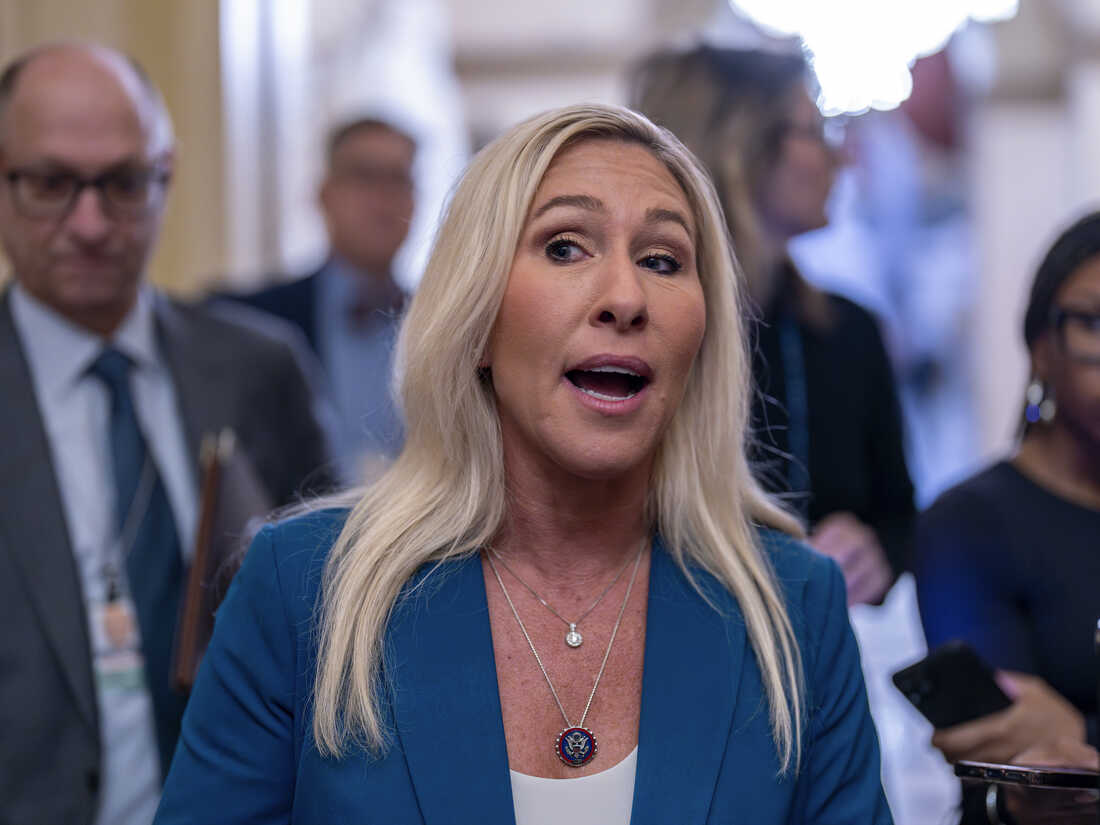
Rep. Marjorie Taylor Greene, R-Ga., talks to reporters after meeting privately with House Speaker Mike Johnson at the Capitol earlier this year.
J. Scott Applewhite/AP
hide caption
toggle caption
J. Scott Applewhite/AP

Rep. Marjorie Taylor Greene, R-Ga., talks to reporters after meeting privately with House Speaker Mike Johnson at the Capitol earlier this year.
J. Scott Applewhite/AP
Rep. Marjorie Taylor Greene, R-Ga., has filed a motion to remove Rep. Mike Johnson, R-La., as House speaker.
Greene and other hard-line conservatives had expressed anger with Johnson’s decision to pass the six remaining appropriations bills for fiscal year 2024 – a $1.2 trillion spending package – to avert a government shutdown with Democratic support. That package passed the House Friday morning and now heads to the Senate. Working with Democrats to avoid a shutdown is also what triggered the push to oust then-Speaker Kevin McCarthy last year.
Greene’s motion is not privileged, meaning it’s unclear if or when it will be brought to the floor for a vote. Greene told reporters after the vote that she has “started the process” of electing a new speaker, but she will not force a vote imminently.
Rep. Thomas Massie, R-Ky., who voted against the spending package and was aware of Greene’s plans, said the move will give House Republicans time to select a new speaker. Greene said House business will continue as she works to build support for a replacement.
The push by House Republicans to oust their own elected leader – for the second time in six months – highlights the deep fractures within the conference. And it comes as Republicans’ razor-thin majority shrinks even further, with Rep. Ken Buck, R-Colo., resigning Friday.
Rep. Mike Lawler, R-N.Y., a moderate, called the attempt “lunacy.” He called on Democratic House Minority Leader Hakeem Jeffries, to pledge that his caucus was “not going to participate in a stunt,” and vote to protect Johnson.
Under current House rules, it only takes one lawmaker to bring up a vote to oust the speaker. But it takes a majority of the House for that vote to pass. In October 2023, Rep. Matt Gaetz, R-Fla., filed the motion to vacate McCarthy from the speakership. Democrats voted as a bloc to remove McCarthy, and eight Republicans, opposed to McCarthy’s decision to pass a bipartisan short-term spending bill, also voted to remove him.
That move brought all House business to a standstill, and set off a chaotic, intra-party fight as Republicans tried to coalesce around a replacement. Johnson was the fourth nominee, after Reps. Steve Scalise of Louisiana, Jim Jordan of Ohio, and Tom Emmer of Minnesota all failed to garner the support necessary to succeed on the floor.
NPR congressional reporter Barbara Sprunt contributed to this story.
This is a developing story and will be updated.




